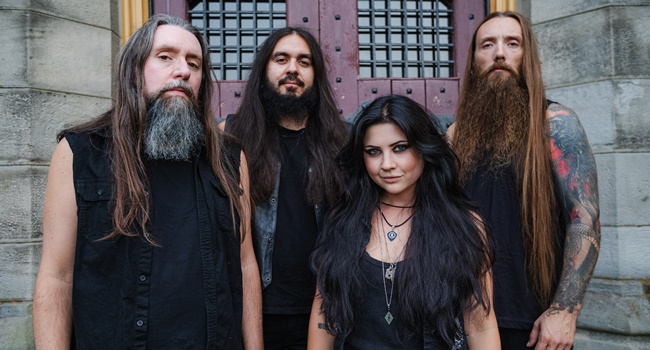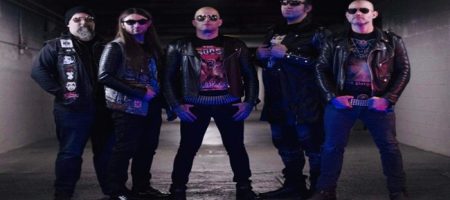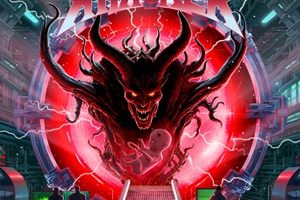Lutharo – Riding Within Euphoria
Tuesday, 5th March 2024
Toronto, Canada has within their ranks another modern melodic metal beast in the form of Lutharo. Steadily establishing their diverse style that includes elements of power, thrash, death influences, a DIY attitude and platform has established credibility beyond the Great White North into international waters. Finally signing with Atomic Fire Records (recently absorbed into the Reigning Phoenix Music umbrella), their second album Chasing Euphoria delivers solid, energetic songwriting, beyond the multitude of dynamic riffs, tempo shifts, and soaring/extreme vocal employment. We reached out to vocalist Krista Shipperbottom to learn more about her early music memories, the work behind Chasing Euphoria, her emotional lyrical content, the social media / video work they’ve done to establish themselves, favorite record / concert memories, and more.
Dead Rhetoric: How would you describe your childhood and early musical memories growing up? At what point did you discover heavier forms of music – eventually leading to your desire to sing in a metal band?
Krista Shipperbottom: Growing up, there was always music in my house. Especially because of my dad, he’s a huge fan of classic rock, blues, and old school music. He is very open-minded when it comes to music, so he always was listening to music. He also worked in a store that was for stereo equipment. Always playing music in the house for me, introducing me to bands like Led Zeppelin, Heart, classic bands at a very early age. That classic rock evolved into metal over the years, but it wasn’t really until high school that I got into the heavy stuff. It was a slow-moving process for me – especially getting into more growling or screaming vocals. It took me a long time for that to be something that clicked – it wasn’t until I heard Arch Enemy, and I heard a girl do this, that I liked it.
Dead Rhetoric: Did you take any singing lessons or participate in school chorus as well to work on your melodic voice?
Shipperbottom: I was always in choir at school. I was very shy, I wasn’t the person who had the solo, I was the person in the background playing a random soft part. I was very introverted in that way, but I loved to be around this. I did the choir; I did musical theater growing up. I had some singing lessons, which helped with a basis for me – but what really helped me learning how to scream and take metal vocals to a serious place is I ended up going to Melissa Cross and Mary Z., who are very well-known metal vocal coaches to get me on the right path. The rest is just self-taught, although a lot of this is trial and error. You have to find your own flow.
Dead Rhetoric: Lutharo formed in 2014 evolving out of your previous band Incarnadine. What can you tell us about the early rehearsals and formative stages of the group – did you also know straight away the type of metal you wanted to develop?
Shipperbottom: We started when we were really young, around nineteen. We really had no idea, we just wanted to play metal and we were playing whatever felt good to us. At that point we were trying to mold into what we could become. We would throw a bunch of influences at a wall and see if something could stick. Laying it all out – but it wasn’t until we came out with Unleash the Beast that we got on the right track, this is where we were going, we like this sound, and I started writing not so much about fairy tale stuff. When we first started, I loved Lord of the Rings, medieval stuff, fairytale-esque things like that. It was good, but it wasn’t connecting. When I started writing about things that connected to my life with Unleash the Beast, we were developing our own thing. Not only were the guys finding themselves instrumentally, I was finding myself too as a vocalist.
Dead Rhetoric: Chasing Euphoria is the second album for Lutharo – your first since signing with Atomic Fire Records. How did you gain the interest of this label, and how would you compare the songwriting and recording sessions for this set of material versus the band’s previous discography of independent EP’s and Hiraeth album?
Shipperbottom: The label, we were just kind of hoping that somebody would notice us. We put ourselves out there, we are constantly out there on social media, throwing whatever we have out there and hoping that people hear it. We were looking for a label at that time, they found us, and it was very exciting. It was all about putting ourselves out there and hoping people would see it.
As far as the music changing, it’s just another thing of us evolving so much as musicians. We know how we all write and how we work. We know what we need to do, and we did it, but we are so comfortable with each other now the experimental process was so much easier. I feel like more emotion came out that way, and more personality came out. Hiraeth, we started to do that, and we had a lot of extra time because of the pandemic to write music and home in on every piece of it. This album was a whole other beast of becoming a whole layer of comfort, let’s just lay it out on the line, we are not going to hide anything – especially when it comes to emotion. I know for me, this is the most emotional album that I’ve ever written, it’s extremely personal.
Dead Rhetoric: Is it more of a challenge to write a longer song like “Freedom of the Night” versus the shorter, more compact tracks?
Shipperbottom: Honestly, no (laughs). I feel like we have a harder time writing something that is short. Because we like to tell stories with our music, and we like to go into all kinds of different places as you might have noticed. We have a lot of different influences in a lot of different genres going on, it’s hard for us to write a one and done banger! (laughs). “Freedom of the Night”, that was easy, but it wasn’t. It was easier than writing something quick and balls to the wall, but it had it’s own struggles in that way.
Dead Rhetoric: Possessing a seasoned musical asset as drummer Cory Hofing (of Crimson Shadows) behind the boards for recording duties, does this ensure a bit more confidence that you achieve the best takes and take an objective look at what Lutharo achieves song by song?
Shipperbottom: For sure. Especially, its really great to have someone recording you that knows exactly what you want. Knows exactly how the sound is going to be, knows exactly what you are trying to say. Having someone behind the boards like that that knows exactly what to do, and what they want to make out of this, is a huge thing. Also, once again, having them there when I was recording and having (guitarist) Victor (Bucur) there, its so comforting for me to push me out of my shell. It’s better for me than going to a random studio and being all nervous. Whereas I’m already comfortable in this environment, I’m comfortable with these people, they are my friends, and they know what I’m capable of, they know how to push me. It made everyone’s time in the studio that much better. It was easier to calm down and get the best things out of us.
Dead Rhetoric: What fuels the lyrical content for the group? Where do you also decide when to diversify your vocal delivery and attack, as you possess equal abilities with clean melodies and the extreme angles?
Shipperbottom: I take things from my every day life as vocal inspiration and lyrical inspiration. That’s what makes things so personal for me, and I’ve gone through a lot this last little bit. There was a lot I was afraid to talk about, or afraid to face over the years. With this album I said screw it – I’m going to write about it, face it head on. These songs were hard for me to write – especially “Freedom of the Night”, that one had my knees weak, I was crying. The guys were getting emotional in the studio about that one. It’s all very personal to me.
As far as my vocal delivery is concerned, I decide whether to sing or scream based on the lyrics and how the song feels. Sometimes if it’s a more intense part, I should be screaming here, or if things are softer or convey more emotion, I need to sing here, feel it out. Sometimes I’ll go in and try both things out to hear what sounds better. Which one hits different.
Dead Rhetoric: Tell us about the Niklas Sundin cover art for Chasing Euphoria – how did the process work with him from initial conversations to final output?
Shipperbottom: That artwork is probably the most favorite that I’ve ever had for any of our works. I’m happy just thinking about it. What happened is, we are on a tight budget, as a band – especially at that point an independent band, and still being on a tight budget just being signed to a label. He told us that he had some artwork that he was working on previously that he hadn’t sold yet or hadn’t completely finished. He showed us what is now our artwork, we saw it and we could not give up this artwork. I didn’t care how much it cost; it was cheaper for us too because it’s something that he didn’t create from the ground up. It’s interesting, because we’ve always had something created from the ground up, but it’s almost as if it was made for us. We talked to him, we said yes, that’s it – finish it up. Those weren’t the original colors, either – we told him what we wanted and what the vibe of the album was too. He made the colors according to what we had told him.
Dead Rhetoric: You’ve released three videos to date for the record – including “Born to Ride” which showcases a bit more of your engaging personalities in a fun, racing atmosphere. What are your thoughts on your work to date with this medium – any special stories to tell, and do you believe this helps build the brand of the band globally as much as the recordings and live performances?
Shipperbottom: Yeah. Like you said, we’ve released a few videos recently, and we’ve had some people write to us and say, what kind of music are you trying to get out there? We have a funny video that’s so carefree, and then we have a serious one. Usually, the music is really serious based, the instrumental parts, the lyrics, everything altogether. But we put out a funny thing. Just because the video is funny doesn’t mean that the actual meaning behind the song is funny. We wanted to have something that was different for that video because we are silly, and anyone who knows us, especially on a personal level, knows we are very silly. We wanted to showcase a different part of our personalities a little bit, going away from the serious, heavy stuff.
Putting videos out there, I think it helps us so much more. We like to give them a visual thing. I love doing videos, I want what comes out in my head to come alive in a story. I feel like having music videos out there has helped get ourselves out there to people who have never heard us before. We put them on platforms like Instagram, Tik Tok, and it will draw random people in. It’s a good thing to have in your tool box, random new fans, rather than just putting music out and hoping for the best.
Dead Rhetoric: It seems like you’ve embraced social media platforms and crowdfunding. How do you feel these avenues have helped build things for the band?
Shipperbottom: Getting our stuff out there, we want to be able to achieve a bigger audience. We release things, and if we thought we could sit back and let things happen in this day and age, it’s not going to. It sucks, it’s not the 70s anymore where people go out to a bar, see you, and people sign bands and then they become this big stadium band. It doesn’t work that way anymore. People are more online based, so you have to create most of your content online. You have to be putting out music videos, you have to be putting out constant posts, pictures, music, little clips so that you can reach a bigger audience. It doesn’t just happen organically by going to shows anymore. Unfortunately, as I wish it still did. I feel like that would be a lot easier in some ways because constantly coming up with content can be a little difficult. It can be a little exhausting, but on the other hand it can be really good. When we can’t actually get to other parts of the world, this is our way of reaching these other people. Pros and cons, but it’s hugely important to get online and do that.
Dead Rhetoric: Is this where also working with a company like C Squared Music helps the band beyond the activities your label and the band themselves can achieve for a bigger reach?
Shipperbottom: For sure. Working with a PR company is huge. A lot of bands will know this, especially when they are promoting a new album, you can get things out on your own platform only to a certain level. You need other people to be pushing for you, and putting things out because they have different contacts in different reaches. You do need to look at all the playing fields, and anywhere you can put yourself out there, you just do.
Dead Rhetoric: What do you consider some of the biggest challenges currently facing Lutharo at this stage in the band’s career?
Shipperbottom: Oh… just once again getting ourselves out there. We want to tour, and we want to be touring constantly, but it’s hard to get out there as a smaller band and try to make a name for yourself. You need to earn the trust of people. As good as you are, and as well known as you are sometimes, people just don’t want to put the trust in you and want to bring you out. Trying to get ourselves out there more, touring more, having the money to fund ourselves, we are all working full-time jobs ourselves on top of the music activities, which is a 24-hour job as a band. Being able to get ourselves out there to the point where we can quit those jobs and focus on this, touring constantly and putting out all the content we need, just focusing on this is the goal.
Dead Rhetoric: How would you describe Lutharo when it comes to your live performance and philosophy? What have been some of your favorite shows, tours, or festival appearances to date?
Shipperbottom: I would say energetic, and very in the moment. All of us, when we hit that stage, nothing else matters. From myself, I know in my head I’ve gone through a lot of stages where you have to be perfect, you have to hit this note this way, and whatever. Recently within the last year, I’ve been like no – screw that. I get in the moment and look at every single person in the audience and connect to them. You know the songs, you know the music, you know the notes you have to hit – put that on autopilot, look at these people, and do whatever you can to connect to these people. Use the time wisely to connect with whatever time length your set is. We put everything on the stage, and we just leave it there.
It’s hard to say an exact favorite, because we’ve had so many cool experiences this past year. Touring with Alestorm and Unleash the Archers. The Unleash the Archers shows were the biggest for us, especially playing in our hometown at the Phoenix in Toronto. Growing up in Toronto, being metalheads and seeing so many bands play there – Children of Bodom, Arch Enemy, Behemoth, all these big bands we idolize, and then going and playing that stage was like ‘Woah!!!’ (laughs). It was huge being on the Alestorm tour and playing these places in the states, but Toronto hit harder because the little version of us was impressed to be on the stage where we’ve seen big bands perform, back stage we are hanging out in the area they would hang out in.
Dead Rhetoric: What makes the Canadian metal scene so special and exciting – as there seems to be a lot of talent coming from all parts of your country, in many different styles?
Shipperbottom: With Canadians, it’s crazy. We get this all the time, people saying there are so many good metal bands coming out of Canada. I feel like we are the underdogs in a way, people don’t look at us as much as they do bands from the states or Europe. Because everything here is so far away – it’s hard to tour here, the cities are so spaced out. It makes us have this drive even more. When we want to reach people, we do it with an extra fire.
Dead Rhetoric: When looking at a post from last year on your Facebook page, you mention that writing music forces you to face parts of yourself you’d otherwise neglect – and that you don’t view vulnerability as a weakness, but more of a super power when it comes to connecting to people through self-growth and your struggles. Can you elaborate on how you are able to face fears and overcome them through these endeavors – and how you’ve grown as a person as a result?
Shipperbottom: Having a fanbase behind me now, and just knowing that myself growing up, when I was going through something that was bothering me or having a hard time, I would always turn to music. I connected with music, and I got stuck in my way of writing things that are heavy, or things on a surface level that are still emotional, but I never hit that ground breaking, deep pit of emotion in a way that I did with Chasing Euphoria. It’s because I finally gave in. If I want to be that person for somebody else, or so many different people, then I need to go and dig deep within myself and just emotionally vomit on everything. If I’m not feeling that way, how do I expect other people to? As much as it sucks to open that wound up and sing about it and write about it, I know if I do that, it’s going to help somebody else. That’s why I feel like I’m here, a vessel in a way to help people.
Dead Rhetoric: What worries or concerns do you have most about the world that we are living in currently? If you had the ability, time, and unlimited finances/resources to make things better, what area(s) do you think need to be looked at to take action on most for the greater good of all?
Shipperbottom: Oh my god, that’s way too big of a question! (laughs). There is way too much wrong with the world now, honestly. Down to music alone, all the AI stuff coming out. Anybody can create anything with music, art, and it’s taking away from real artists. In the grand scheme, there’s nothing wrong with that – it’s art, and you still are coming up with something, but at the same time you are taking a job away from an actual artist who’s going to draw it out and create it for you. Same with music – you can create music so easily, unauthentically.
People are struggling to live. The cost of living just where we are is insane. The homeless population is just insane here. Everything is going to shit! (laughs). I feel like if I open this can of worms, it’s going to be too much. Things are in an uproar, so much negative stuff going on. More negative than positive. Building and building, the money situation, homeless communities, music, jobs, I don’t know where to begin to touch on that. I can only offer help through my music and being someone’s therapy.
Dead Rhetoric: What would you consider three of the most important metal albums that shape your outlook on the genre? And what would be your favorite concert memory?
Shipperbottom: Once again, too tough a question. I don’t know if I can narrow it down. When I started getting into metal, Black Sabbath – Black Sabbath is my holy grail. It got me into the beginning of metal. I can’t narrow down specific albums for Megadeth, but they were another band that really was, ‘woah’ for me. I listened to the music so chaotically, I wanted to absorb as much as I could. I’m in high school then and not listening to CD’s as much. Wages of Sin – Arch Enemy. Khaos Legions – Arch Enemy. Those were huge for me.
As far as concerts go. Seeing Iron Maiden in concert for the first time. I was so excited. Seeing Black Sabbath in concert, I think I bawled my eyes out the entire time. Seeing Megadeth, I cried too. People were looking at me like, why? This is so cool – I may never ever get the chance to see this again. Taking it all in. Seeing Children of Bodom for the last time – thank goodness I got to see them when I did. They are a huge inspiration for me and our band. I could go on and on about this topic.
Dead Rhetoric: What’s on the agenda for Lutharo over the next twelve months or so to support this release?
Shipperbottom: Hopefully more tours. More music videos are coming out. More online content for sure, but hopefully touring. We’ve got some things lined up for the new year, more writing. We are already starting to be like, when can we write again? We have the itch again.




























